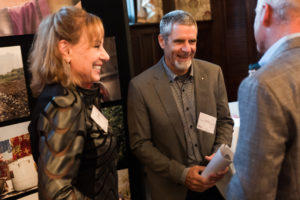LAUREN ROACH
CATHOLIC HERALD STAFF
Their work may not be in your neighborhood, but Catholic Relief Services is working with your neighbor. They just happen to be across the globe.
They just happen to be across the globe.
For 12 years, the Archbishop of Milwaukee has hosted a cocktail reception and speaker for a night devoted to learning more about Catholic Relief Services.
This year, the event on Tuesday, Oct. 1, hosted by Archbishop Jerome E. Listecki and emceed by Carl Holborn, featured a keynote speaker from the frontlines of service. Paul Hicks, director of Water and Agricultural Restoration CRS El Salvador, shared stories from his time in the field, and explained how water connects us all.
A video highlighting the mission of Catholic Relief Services kicked off the evening: “At CRS, we are committed to create the blueprints for sustainable, resilient futures.”
The closing line, “It’s not about imagining another world, it’s about creating one. At CRS that’s what we do,” emphasized the night’s theme: Water Security for All.
After thanking the Milwaukee Event Committee and Archbishop Listecki for the practical wisdom he brings to the CRS Board, Bill O’Keefe, executive vice president of mission and mobilization, shared how much the executive team appreciates and recognizes “the movement you have begun to build here in Milwaukee.”
“We have been pulled along by the people of Milwaukee, by the Archdiocese … and have now accepted the challenge that implicitly you have given us to build similar sorts of communities around the country,” O’Keefe said.
Donations made in the archdiocese make water sustainability projects possible abroad.
Ultimately, the work of Catholic Relief Services is intended to cultivate resilient communities that continue to thrive long after they leave the scene.
Recalling the previous Sunday Gospel, Archbishop Listecki described the parable of Lazarus and the rich man. While Lazarus is at the bosom of Abraham after death, the rich man burns in hell “because he ignored the need,” he said.
Today, 700 million people do not have access to clean water. Though we can feel overwhelmed by that number, Archbishop Listecki reminded those gathered, we cannot eliminate that tragedy for 700 million, “but we can for one. We can quench the thirst of a Lazarus.”
At Catholic Relief Services, their work is all about serving the poor and vulnerable, accompanying those they serve, and making connections.
“Fundamentally, what we are doing is peacemaking,” Hicks said when he took the stage.
Over the course of his address, he focused on three themes: what water scarcity looks like, how CRS connects and heals broken relationships, and the gratitude and grace experienced through the process of gifting water security to rural communities.
In a country where tap water is wasted while brushing teeth and water bottle filling stations are the norm, it is difficult to understand the impact sustainable water sources have on our livelihoods and well-being.
Yet water access can be a matter of life or death, thriving or barely surviving.
“I want to take the risk tonight to lift up the hood and show you how complex these problems are,” Hicks said.
By sharing stories of communities and families that he has worked with in Albania, Haiti and El Salvador, Hicks connected the guests with the reality that water access determines life success.
“Water security is part of a cycle of prosperity and water scarcity becomes a cycle of poverty,” said Hicks.
In his 20 years of service in this field, Hicks learned how conflicts have the potential to create connections. When entering rural communities with fractured histories, the situation “wasn’t about the water, it wasn’t about the engineering … it was social,” he said. His team needed to learn how to help people heal.
Calling on Pope Francis’ vision of interconnectedness in his encyclical Laudato Si, “I used to see conflicts as the problems we had to get over to get the work done, and then I realized that the work that it takes to overcome this conflict is the real work; that’s what we do,” said Hicks.
Hicks now sees conflicts as an opportunity for transformation — of water scarcity to security and conflict to peace.
Sean Callahan, president and CEO, tweeted, “we are not a development agency; we are a relationship agency.” The stories Hicks shared and the work of Catholic Relief Services manifest this mission.
“Our role is to embrace conflict because that is where the stickiness is. This is what sets CRS apart — we work with an incredible network of Catholic partners, we have tens of thousands of staff throughout the world, all of whom are committed to peacebuilding,” Hicks said.
The 2030 goal for Catholic Relief Services is to help 20 million people achieve water security of the 2 billion people who do not have dependable access to safe water — healing and fostering an untold number of relationships along the way.
The consensus following the evening: Catholic Relief Services is a reason to take pride in the American Catholic Church.
“One of the super challenging things about Catholic teaching in the Gospel is our neighbor is the person who lives down the street, the person who lives in our country, and the person who lives around the world,” O’Keefe said.
“We have a responsibility to do everything we can for everybody in our global neighborhood.”
If you are interested in making a financial gift to Catholic Relief Services to support one of these projects:
Water Pump Repair $235
Community Latrine $420
Watering Station $1,300
Visit crs.org/event
